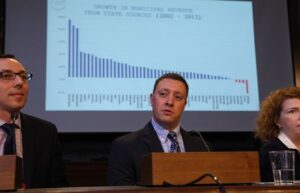What’s happening in Flint, Detroit and other cities is a symptom of a larger problem. A problem where cities in Michigan are only allowed to fall with the economy but not to prosper as the economy grows. And it’s only going to get worse if we don’t change the way the nation invests in communities.
This was a key message by the Michigan Municipal League’s John LaMacchia when speaking Thursday in Washington D.C. as part of Infrastructure Week 2016. The Infrastructure Week celebration organized by the National League of Cities and its partners is to raise awareness about the nation’s infrastructure needs. Cities construct and maintain the majority of our nation’s infrastructure and depend on a solid infrastructure network to provide safe and healthy communities, and grow their local economies.

The League’s John LaMacchia is in Washington D.C. this week for the National League of Cities Infrastructure Week celebration. As part of his work, LaMacchia (center left) met with U.S. Rep. Dan Kildee (right).
LaMacchia, assistant director of state affairs for the League, spoke as part of a panel discussion on “Securing Our Water Future: 21st Century Solutions for 21st Century Cities”. Other panelists were Council Member Matt Zone, City of Cleveland, Ohio, and National League of Cities 1st Vice President; Council Member Ron Nirenberg, City of San Antonio, Texas, and Chair, National League of Cities Energy and Environment Committee; Commissioner Heather Repenning, President Pro Tempore, Los Angeles Board of Public Works; Tyrone Jue, Senior Advisor on Environment to Mayor Ed Lee, City of San Francisco, California; Jonathan Trutt, Executive Director, West Coast Infrastructure Exchange; and Clarence E. Anthony, CEO and Executive Director, National League of Cities.
LaMacchia discussed the Flint water crisis and explained how the Flint issue is part of a much larger infrastructure problem in communities statewide.
Some of his key points included:
- Flint Mayor Karen Weaver and Gov. Rick Snyder agree Flint’s lead-tainted service lines need to be removed. But it will take at least $55 million to replace all the lead-tainted lines. Money for water infrastructure has been put into appropriations bills in the Michigan Legislature and U.S. Congress, but the bills are still making their way through those legislative bodies.
- The service lines are just part of the problem. The rest of Flint’s water system, from aging water mains to other infrastructure, needs to be totally replaced. The city’s water system loses a large percentage of the water to leaks, one reason Flint has some of the highest water rates in the country. Again, the City of Flint will need help from the state and federal governments to modernize its water infrastructure, a process that is expected to cost of hundreds of millions of dollars.
- When we look at Michigan as a whole we have neglected to properly invest, maintain and right size our infrastructure.
- For nearly 30 years Michigan has been about 10 million people yet we have increased the amount of infrastructure in the state by roughly 50% and giving little thought to how we would maintain both the old and new infrastructure.
- Time and time again we have built new water and sewer plants without capitalizing on the existing capacity of a nearby system.
- This not only speaks to how we have been inefficient in managing infrastructure in Michigan but also how we have disinvested in our communities in general.
- Why cities are important: Our goal at the Michigan Municipal League is to make Michigan communities places people want to be. Places that can attract a talented work force and businesses. Having placemaking strategies in all communities is important. But it’s hard to even think about creating great places when you’re fighting every day not to drown. How can you attract businesses and a work force if your roads are crumbling, bridges are in disrepair and you’re communities have slashed the number of police officers, firefighters, public works employees and more?
- The numbers show that some states – particularly Michigan – do not understand the importance of cities as economic drivers. If they did they would be investing in cities. But unfortunately they are disinvesting in cities.
- According to U.S. Census data all but one state showed growth in municipal general revenue between 2002 and 2012. View chart here.
- Many want to blame this on a single state recession but the numbers tell a different story.
- Why is this the case in Michigan – property values decrease in 2008 crash and the Michigan Constitution limits their ability to recover, PLUS revenue sharing to the tune of $7.5 billion over the last decade plus.
LaMacchia concluded explaining Michigan’s system for funding municipalities is fundamentally broken and unless it gets fixed we’re going to see more situations like what’s happening in Flint and Detroit occur in other communities.
Also earlier this week, NLC released a new report called, Paying for Local Infrastructure in a New Era of Federalism. Read a blog about the report by the League’s Summer Minnick.
Matt Bach is director of media relations for the Michigan Municipal League. He can be reached at [email protected] and 734-669-6317.

